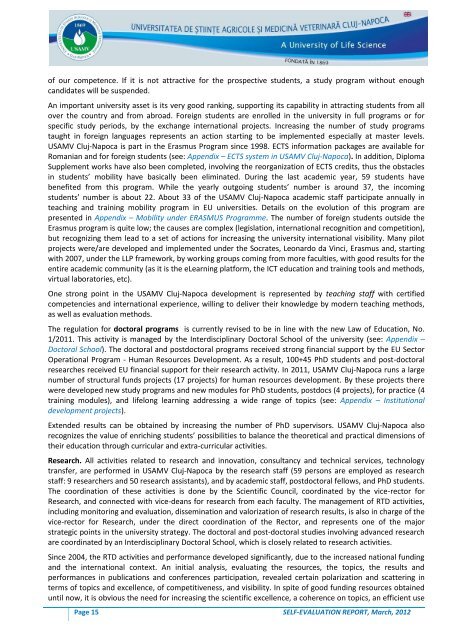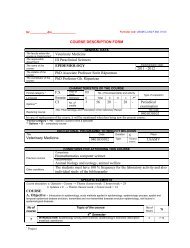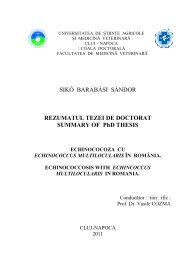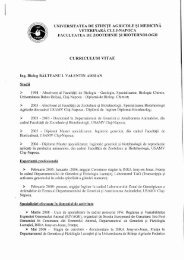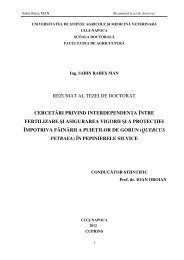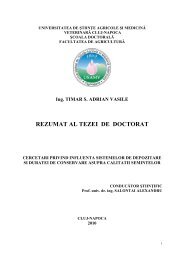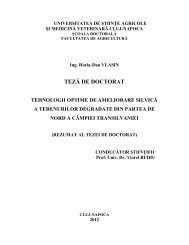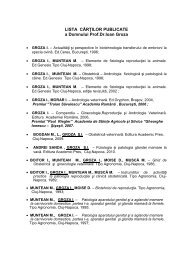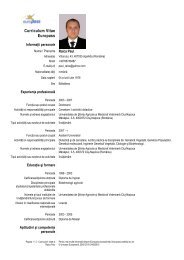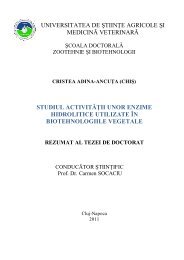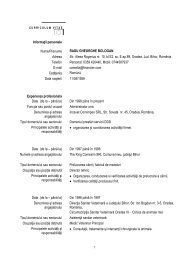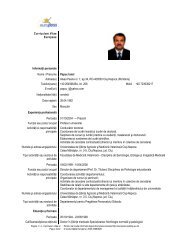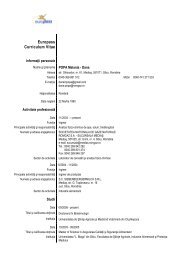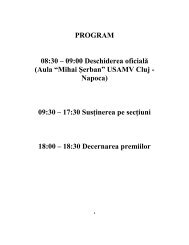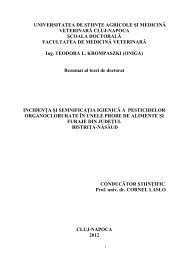self evaluation report - Universitatea de Ştiinţe Agricole şi Medicină ...
self evaluation report - Universitatea de Ştiinţe Agricole şi Medicină ...
self evaluation report - Universitatea de Ştiinţe Agricole şi Medicină ...
Create successful ePaper yourself
Turn your PDF publications into a flip-book with our unique Google optimized e-Paper software.
of our competence. If it is not attractive for the prospective stu<strong>de</strong>nts, a study program without enough<br />
candidates will be suspen<strong>de</strong>d.<br />
An important university asset is its very good ranking, supporting its capability in attracting stu<strong>de</strong>nts from all<br />
over the country and from abroad. Foreign stu<strong>de</strong>nts are enrolled in the university in full programs or for<br />
specific study periods, by the exchange international projects. Increasing the number of study programs<br />
taught in foreign languages represents an action starting to be implemented especially at master levels.<br />
USAMV Cluj-Napoca is part in the Erasmus Program since 1998. ECTS information packages are available for<br />
Romanian and for foreign stu<strong>de</strong>nts (see: Appendix – ECTS system in USAMV Cluj-Napoca). In addition, Diploma<br />
Supplement works have also been completed, involving the reorganization of ECTS credits, thus the obstacles<br />
in stu<strong>de</strong>nts’ mobility have basically been eliminated. During the last aca<strong>de</strong>mic year, 59 stu<strong>de</strong>nts have<br />
benefited from this program. While the yearly outgoing stu<strong>de</strong>nts’ number is around 37, the incoming<br />
stu<strong>de</strong>nts’ number is about 22. About 33 of the USAMV Cluj-Napoca aca<strong>de</strong>mic staff participate annually in<br />
teaching and training mobility program in EU universities. Details on the evolution of this program are<br />
presented in Appendix – Mobility un<strong>de</strong>r ERASMUS Programme. The number of foreign stu<strong>de</strong>nts outsi<strong>de</strong> the<br />
Erasmus program is quite low; the causes are complex (legislation, international recognition and competition),<br />
but recognizing them lead to a set of actions for increasing the university international visibility. Many pilot<br />
projects were/are <strong>de</strong>veloped and implemented un<strong>de</strong>r the Socrates, Leonardo da Vinci, Erasmus and, starting<br />
with 2007, un<strong>de</strong>r the LLP framework, by working groups coming from more faculties, with good results for the<br />
entire aca<strong>de</strong>mic community (as it is the eLearning platform, the ICT education and training tools and methods,<br />
virtual laboratories, etc).<br />
One strong point in the USAMV Cluj-Napoca <strong>de</strong>velopment is represented by teaching staff with certified<br />
competencies and international experience, willing to <strong>de</strong>liver their knowledge by mo<strong>de</strong>rn teaching methods,<br />
as well as <strong>evaluation</strong> methods.<br />
The regulation for doctoral programs is currently revised to be in line with the new Law of Education, No.<br />
1/2011. This activity is managed by the Interdisciplinary Doctoral School of the university (see: Appendix –<br />
Doctoral School). The doctoral and postdoctoral programs received strong financial support by the EU Sector<br />
Operational Program - Human Resources Development. As a result, 100+45 PhD stu<strong>de</strong>nts and post-doctoral<br />
researches received EU financial support for their research activity. In 2011, USAMV Cluj-Napoca runs a large<br />
number of structural funds projects (17 projects) for human resources <strong>de</strong>velopment. By these projects there<br />
were <strong>de</strong>veloped new study programs and new modules for PhD stu<strong>de</strong>nts, postdocs (4 projects), for practice (4<br />
training modules), and lifelong learning addressing a wi<strong>de</strong> range of topics (see: Appendix – Institutional<br />
<strong>de</strong>velopment projects).<br />
Exten<strong>de</strong>d results can be obtained by increasing the number of PhD supervisors. USAMV Cluj-Napoca also<br />
recognizes the value of enriching stu<strong>de</strong>nts’ possibilities to balance the theoretical and practical dimensions of<br />
their education through curricular and extra-curricular activities.<br />
Research. All activities related to research and innovation, consultancy and technical services, technology<br />
transfer, are performed in USAMV Cluj-Napoca by the research staff (59 persons are employed as research<br />
staff: 9 researchers and 50 research assistants), and by aca<strong>de</strong>mic staff, postdoctoral fellows, and PhD stu<strong>de</strong>nts.<br />
The coordination of these activities is done by the Scientific Council, coordinated by the vice-rector for<br />
Research, and connected with vice-<strong>de</strong>ans for research from each faculty. The management of RTD activities,<br />
including monitoring and <strong>evaluation</strong>, dissemination and valorization of research results, is also in charge of the<br />
vice-rector for Research, un<strong>de</strong>r the direct coordination of the Rector, and represents one of the major<br />
strategic points in the university strategy. The doctoral and post-doctoral studies involving advanced research<br />
are coordinated by an Interdisciplinary Doctoral School, which is closely related to research activities.<br />
Since 2004, the RTD activities and performance <strong>de</strong>veloped significantly, due to the increased national funding<br />
and the international context. An initial analysis, evaluating the resources, the topics, the results and<br />
performances in publications and conferences participation, revealed certain polarization and scattering in<br />
terms of topics and excellence, of competitiveness, and visibility. In spite of good funding resources obtained<br />
until now, it is obvious the need for increasing the scientific excellence, a coherence on topics, an efficient use<br />
Page 15 SELF-EVALUATION REPORT, March, 2012


